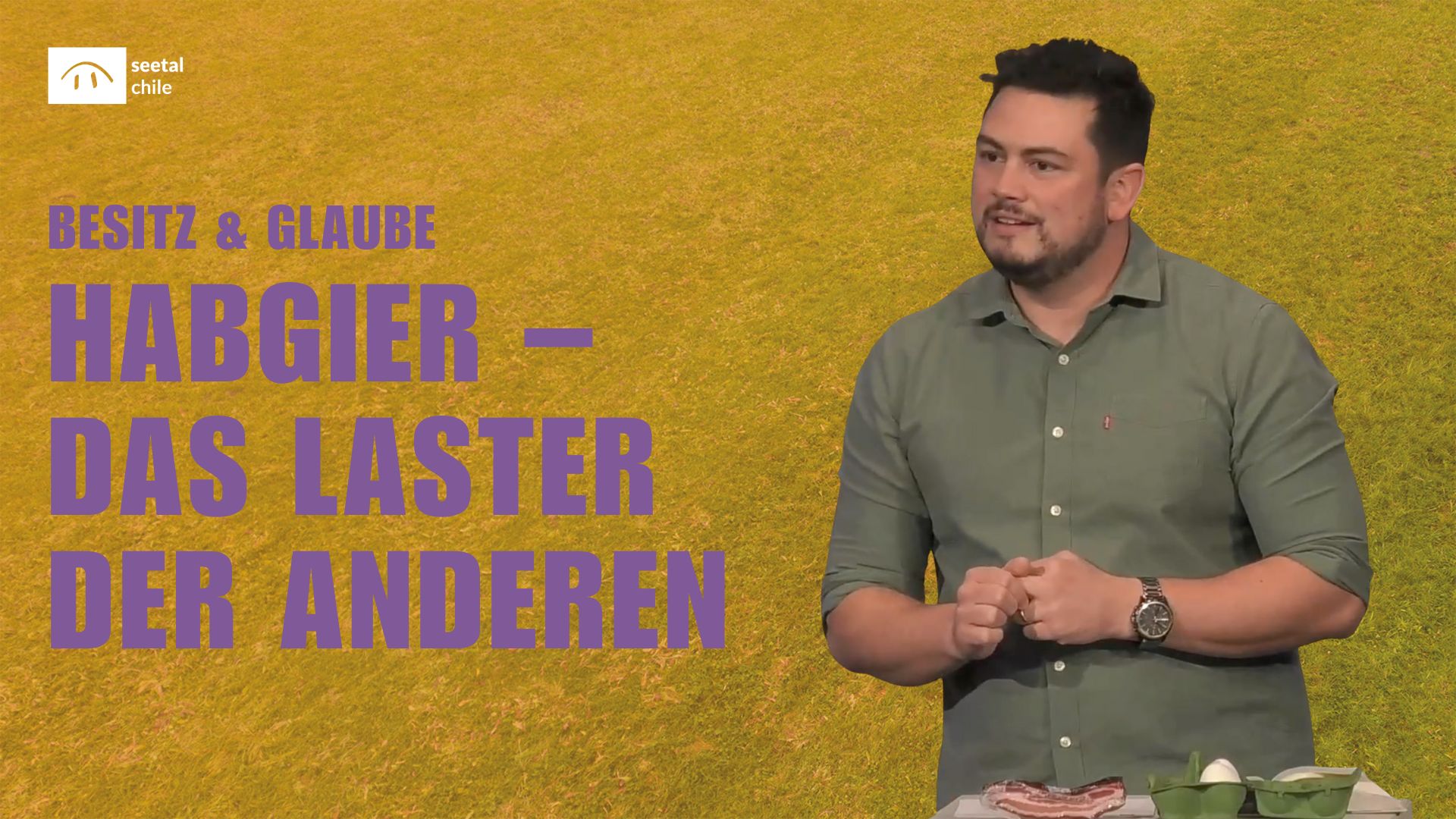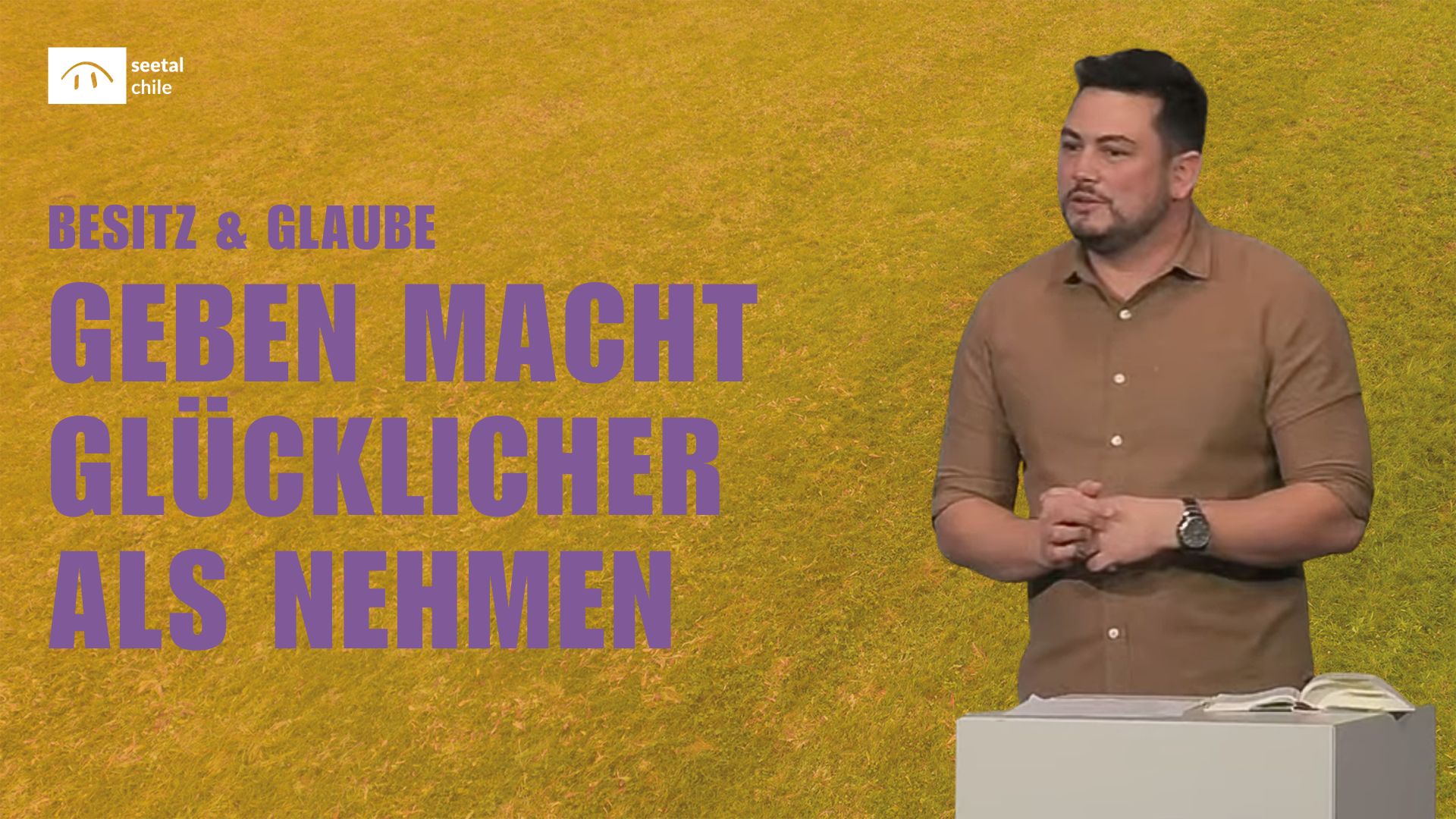Unthinkable – Get used to different or why pattern breaking is part of being a Christian
Series: Holy – Holy – Holy | Bible text: Luke 5:1–11; 2 Corinthians 5:17
Many things that you might think are unthinkable in life are in God’s reality also changeable. Your previous wealth of experience does not have to remain the limit of your future possibilities! With Jesus, existing patterns of life are broken and thus you are confronted again and again with the rethinkable.
Lord, give us a heart for your word and also a word for our heart. Amen.
Our life patterns
Do you also know such situations in which you react in a similar way again and again? In which you repeatedly behave in the same way? For example, that you always sit in the back rows when you go to the cinema or church service. Or that you quickly defend yourself when you receive critical feedback, or that you switch to attacking and thus don’t let your counterpart get a word in edgewise. I myself had the habit for a long time that when people gave me compliments, I didn’t want to accept them. I constantly made myself smaller than I really was and had trouble accepting praise from others. Until someone explained to me that by my behaviour, I was undervaluing what was important to others.
Such repetitive behaviours are called «patterns». We always speak of life patterns when we consciously or unconsciously behave similarly or in the same way in different life situations. Some of these learned patterns are good and give us security from the experience we have gained. Others are rather difficult because we repeatedly fall into destructive patterns that we ourselves do not want, but also cannot simply discard! We have adopted such patterns from our parents, from our family, from our childhood. We have adopted some of them as values because everyone around us behaves in this way. Because that’s what «people» do in our culture or in the church. With other patterns, we have learned that they protect us. Then we prefer to take a back seat and let others go first.
The theme of the sermon is: «Unthinkable – get used to different or why pattern breaking is part of being a Christian».
Change of view with Jesus
I have brought you a video clip from «the chosen». This new Jesus film series is about looking at Jesus from the human perspective of his chosen disciples. The subtitle of the first season is appropriately called «Get used to different.»
I take you to the Sea of Galilee, where Jesus meets Simon the fisherman for the first time on the shore and confronts him with the patterns he was used to (video clip). Yes, some things in our own lives that we may have thought to be unconceivable, is in reality also atconceivable. That is, it is not impossible per se, it just has to be seen differently, thought of in a new way and reinterpreted. For Simon, that was the case here. It was clear to him that after a long, unsuccessful night of fishing, it made no sense at all to cast the nets again in daylight in the morning. He knew from experience that fishing is best done in the quiet of the night. All his fellow fishermen would have confirmed this to him and it is well known that you don’t catch the most fish in broad daylight, but in the darkness and silence of the night. And yet, after a long, very intense exchange of glances with Jesus, he agrees to break his usual pattern.
During the preparation I asked myself why Jesus had worked this fish miracle? Was it really about Simon’s tax debts, as Zebedee, the father of James and John, had said, which could now be settled by this magnificent catch? Did Jesus want to help the two brothers Simon and Andrew out of existential and financial need through this catch? Yes, perhaps? We do not read anything about it directly in the Gospels. But just because it was not written down in the Bible, does not mean that it did not happen! I do believe that Jesus also cares about our everyday worries; finances, health, job, family […].
However, I can just as well imagine that Jesus wanted to confront Simon with what was unthinkable for him. Perhaps Simon also needed to get used to something different from what he had known so far. Perhaps a certain kind of pattern breaking is a fundamental part of following Jesus! It may well be that Simon should learn right from the start that his previous wealth of experience does not have to remain the limit of his future experiences. Together with Jesus, things can and should be different from what he has been used to.
Principle of the not-yet
In our living room hangs a quote from the church father Augustine. «Miracles are not against nature, but only against the nature we know. With this, Augustine probably wanted to make it clear: «Just because I have not experienced and personally witnessed some things (miracles) myself, does not then mean that they are also per se impossible!» That is why I now like to hear the experiences of others and their stories of what they experienced with Jesus.
Because mostly it is about the fact that these people have experienced something that they had not expected or experienced before. I can well imagine that Jesus wanted to make the Christian «principle of the not-yet» clear to Simon here. At the moment, I am still in the process of acquiring this «Jesus principle of the not-yet». For me, it looks something like this today: When someone asks me if I can cook, I no longer say: «No, I can’t cook. But,… «Yes, I don’t know how to cook yet!» Do you notice the little difference? When I say I can’t cook, I’m committing myself. Then that’s the way it is and will probably stay that way in the future. If, on the other hand, I answer that I still I continue to open up the possibility that things can be different for once and that they can become different with the help of my son, my wife (or God’s grace ;)). I am firmly convinced that breaking patterns, leaving what I am used to, is a fundamental part of being a Christian.
To live in discipleship does not mean to be static, but to be mobile, agile and changeable in the truest sense of the word. Following means – going after Jesus. He leads the way and I follow his example. I trust his recommendations as to where his path or his exemplary behaviour will lead me. Jesus often starts with what we already know and what we can already do. I call this «sanctifying natural gifts» – (music, finances, organisation, working for others.) Jesus wants to expand your potential and your wealth of experience so far, to add to it with his unlimited possibilities.
In our story, Jesus promotes Simon the fisherman to fish for men. This profession did not exist until then either! In future, Simon is no longer to catch fish in the Sea of Galilee, but to network people for Jesus. Jesus starts with his profane professional qualification, but he increases, sanctifies and uses his normal abilities by now becoming a fisher of men in God’s dawning kingdom. Today, in school and in professional life, we speak of «lifelong learning.» «You virtually never stop learning…» Modern brain research shows that we can continue to learn into old age. (The saying, what a man doesn’t know, he never learns, has been disproved today).
The sanctification
The Bible speaks of «sanctification» in the same context. For sanctification is nothing other than a process of lifelong spiritual learning in discipleship. «He who is holy should continue to seek sanctification». (Revelation 22:11). Spiritual learning does not stop when I already know the outcome of Bible stories or where they are in the Bible. There is a principle in adult education that can also be understood spiritually: «Learning as an adult also means unlearning again and again. That is, to leave old patterns and break them. Learning has more to do with experience, action and implementation rather than cognitive knowledge and this is no different in discipleship with Jesus. Because what was right 20 years ago can be wrong or outdated today (childhood eating at the table…).
Being a Christian does not live from my memory or past experiences, as important as these can always be. Living faith needs present experiences that Jesus can still work today beyond asking and understanding and wants to change me and my behaviour. «But to him who is able to do exceeding abundantly above all that we ask or understand, according to the power that works within us, to him be glory in the church and in Christ Jesus.» (Ephesians 3:20). Have you ever thought about what that means?! This overwhelming experience of the miracle of the fish makes Simon fall on his knees before Jesus and worship. Simon acknowledges at this moment that Jesus is the Lamb, the incarnate Son of God. And again something paradoxical happens. Simon does say: Go away from me Jesus, for I am a sinful man. We don’t fit together at all. I don’t deserve this and I’m not worthy of what is happening to me here. But Jesus contradicts, he formulates the unthinkable and challenges Simon to get used to something else by inviting him anyway and asking him to follow him. Jesus even goes one step further and later gives this man kneeling at the bottom of the river a new name. Here, too, patterns are broken, for Simon will later be called Peter. Through this learning experience, Simon recognises who Jesus is and can later become a stabilising rock through this confession.
Again and again we read in the New Testament that pattern breaking is part of faith. At least 5 times in the epistles it says that we are to put off the old man together with his old habits.
Because our learned habits, our human way of being, do not bring us any further – do not bring us close to God. The greatest change in faith, the most rethinkable for us human beings and the strongest pattern breaking happens in the crucifixion and baptism. Here everything is turned upside down and turned around for the better. In baptism, the change from old to new happens. From death to life and from sin to grace. On the cross, the unthinkable happened, that we are adopted into God’s holy family, that we may be called sons and daughters of God and call Jesus Christ our brother. This pattern-breaking is unthinkable for non-believers. But in and through baptism we confirm that the Spirit of the Holy God lives in us and that by His power we are no longer bound to what seems to want to keep us stuck and the same in life.
Therefore, I believe it is worthwhile, like Peter, to dare to do «counter-intuitive things» with Jesus and to cast the nets during the day. Later, on another occasion, Peter got out of the boat in the middle of the lake to meet Jesus on the water. Some think this is crazy! But all those who sat in the boat and just watched missed this experience of Jesus carrying and holding even on the water. In my opinion, it pays off to rethink what is perhaps unthinkable for us and to trust Jesus with more than we have experienced so far. We give Jesus the greatest honour if we do not limit him with our limited knowledge and our experiences. Because our previous personal wealth of experience does not have to be the limit of our future horizon of experience. I believe that Jesus always wants to surprise us when we make our life-boat available to him as a stage, as Simon did.
Think about what your patterns are that limit your life unnecessarily. Where do they come from? What sense do they make for you today? And if no patterns come to mind, then have the courage to honestly ask another person which patterns can still be changed with Jesus. Because what is written in 2 Cor. 5:17 applies: «Whoever lives with Jesus Christ becomes a new person. He is no longer the same, because his old life (habits/patterns) is over. New has begun» (2 Corinthians 5:17). For most people, this transformation does not happen overnight, but is a lifelong learning process. Until one day in eternity we will be as God intended us to be from the very beginning.
Possible questions for the small group
Read the Bible text: Luke 5:1–11
- What patterns do you see in your life?
- Which of the patterns are helpful and which are a hindrance?
- What people come to mind that you can approach about your patterns?
- Where has Jesus already broken through your horizon of experience so that you have been surprised?




